MS1
 Undergraduate Institution: Ball State University & Lewis University
Undergraduate Institution: Ball State University & Lewis University
Research: At Ball State University, I conducted interdisciplinary research on healthcare and informatics under Dr. Chris Davison. My work focused on evaluating a cloud hybrid architecture system designed to enable real-time data exchange for first responders during disaster scenarios. Concurrently, I contributed to an artificial intelligence model that optimized energy usage. Building on this, I transitioned to join Dr. Sarah Powers at Lewis University to investigate cyclin D3-mediated transcriptional regulation using a neutrophil model. Here, I gained experience with bioinformatics platforms, employing them to understand transcription factor binding landscapes. My future aspirations include continuing to leverage computational tools to uncover regulatory mechanisms in cancer biology. I am committed to integrating my background in business, informatics, and biomedical science to pursue translational research that bridges molecular discovery with clinical application.
 Undergraduate Institution: Ohio State University
Undergraduate Institution: Ohio State University
Research: As an undergraduate at Ohio State, I explored antisense oligonucleotide gene therapy approaches for Duchenne Muscular Dystrophy and Huntington’s disease. Additionally, I spent time at the Buck Institute investigating how exogenous ketone esters influence proteostasis in aging and Alzheimer’s disease. I then returned to Columbus and worked full-time in the Samaranch Lab, contributing to research on gene therapy for multiple central nervous system disorders. The projects I worked on included characterizing neurotrophic factor delivery for Parkinsonian models, studying the safety of various AAV delivery regimens, and evaluating the therapeutic efficacy of gene therapy for MAO-A and AADC deficiency. My research experiences have deepened my interest in aging-related neurodegeneration and using molecular therapies to achieve meaningful clinical outcomes. As an MSTP student, I aim to advance treatments for aging-related neurodegenerative diseases.
 Undergraduate Institution: Indiana University
Undergraduate Institution: Indiana University
Research: As an undergraduate, my research focused on the disulfide bond formation pathway in bacteria as a novel target for antimicrobial development. I developed a fluorescence microscopy protocol to observe and characterize the phenotypes of mycobacteria when components of this pathway were deleted or inhibited. After graduating, I continued in the lab for an additional year, expanding the project to compare phenotypes resulting from cysteine residue mutations in key disulfide-bonded proteins. I also began expressing human and viral VKOR proteins in an E. coli background to establish a model for antimicrobial selectivity and to determine their membrane orientation, respectively. Through the MSTP, I hope to build on these foundational experiences in bacterial pathogenesis and protein function to conduct translational research on antibiotic resistance, host-pathogen interactions, and infectious disease.
 Undergraduate Institution: Butler University
Undergraduate Institution: Butler University
Research: My undergraduate thesis investigated how the G protein-coupled receptor FSHR-1 regulates synaptic transmission at the neuromuscular junction in Caenorhabditis elegans. I demonstrated that FSHR-1 promotes cholinergic neurotransmission through cell non-autonomous mechanisms involving the intestine, glia, and neurons. These findings support a broader model in which inter-tissue signaling modulates neuronal output and excitation-inhibition balance. I am broadly interested in mechanisms of synaptic regulation and inter-tissue communication in the context of neurodegeneration, especially Alzheimer’s disease. Long-term, I hope to pursue translational work that uncovers therapeutic strategies for preserving synaptic integrity and preventing neural circuit failure.
 Undergraduate Institution: Indiana University
Undergraduate Institution: Indiana University
Research: As an undergraduate researcher, I investigated the effects of chronic and binge alcohol paradigms on tau pathogenesis and neuroinflammation in mouse models at the MODEL-AD lab. I also worked on a project that utilized dry electroencephalography to characterize frontal alpha asymmetry as a cognitive marker for mood in response to visual stimuli. As a future physician-scientist, I plan to study neurological and neurodegenerative diseases in more depth and work toward potential treatments or therapies.
 Undergraduate Institution: University of Notre Dame
Undergraduate Institution: University of Notre Dame
Research: As an undergrad, my research focused on pancreatic cancer therapeutics and the optimization of a kinase activity assay, with the goal of identifying novel kinase inhibitors and investigating their anti-tumor efficacy. Following my graduation, I spent two years in the translational small cell lung cancer lab of Dr. Misty Shields, where I focused on biomarker identification/verification and novel therapeutic approaches. As I begin the path to become a physician-scientist, I aim to mitigate the burden of cancer for patients and their families by studying mechanisms of chemoresistance and identifying novel therapeutic vulnerabilities.
 Undergraduate Institution: Purdue University
Undergraduate Institution: Purdue University
Research: I began my research journey as an undergraduate assisting in the development of a microphysiological system designed to maintain and evaluate the viability of pancreatic islets. After transitioning into my master’s thesis, I investigated regenerative strategies for volumetric muscle loss (VML)—a trauma induced condition that results in debilitating muscle dysfunction. My thesis focused on how microstructural variations in engineered collagen polymeric scaffolds affect tissue restoration. As part of this work, I also developed a novel computational tool for histological analysis. In parallel with my academic endeavors, I have contributed to multiple medical device projects. Collaborating with Geniphys, I helped develop an anti-clogging injector for in-situ polymerizing collagen materials. Additionally, I worked with a multi-institutional team to improve devices used for neonate bilirubin monitoring. Moving forward, I aim to continue innovating at the intersection of regenerative medicine and device development, with a focus on translational solutions for pressing clinical needs.
 Undergraduate Institution: Goshen College
Undergraduate Institution: Goshen College
Research: My research has focused on characterizing human immune responses to viral infections and vaccinations through laboratory and data-driven lenses. As an undergraduate, I contributed to a Distributed Drug Discovery (IU Indy) project in Dr. Doug Schirch’s lab at Goshen College and investigated dengue virus infectivity in Dr. Rushika Perera’s lab at Colorado State University. Following graduation, I completed a postbaccalaureate IRTA research fellowship in Dr. Nan-ping Weng’s lab at the National Institute on Aging, where I studied longitudinal CD8+ T cell responses to SARS-CoV-2 infection and vaccination using single-cell sequencing, primary human cell culture, and flow cytometry. I then earned a Master of Public Health from Johns Hopkins Bloomberg School of Public Health, concentrating in Epidemiologic and Biostatistical Methods for Public Health Practice and Clinical Research, with additional certification in Health Communication. While at Hopkins, I worked in Dr. Sabra Klein’s lab to examine sex differences in influenza vaccine responses using systems serology data and statistical modeling. As a future physician-scientist, I aim to investigate immune responses in ways that integrate laboratory research, clinical insight, and population health perspectives.
MS2
 Undergraduate Institution: University of Wisconsin-Eau Claire
Undergraduate Institution: University of Wisconsin-Eau Claire
Research: As an undergraduate researcher, I used molecular dynamics simulations to analyze SAR-CoV-2 spike protein binding kinetics and compare the strength of protein interaction networks among several virus variants. After graduating, I joined a transplant immunology lab focused on advancing therapeutics for kidney transplant recipients and improving graft survival and function through novel methods of immunosuppression. I worked on multiple projects investigating the efficacy of antibody and cellular-based therapies involving CAR-T cells, myeloid-derived suppressor cells, and xenotransplantation in nonhuman primate and murine models. Currently, I’m interested in continuing research within immunology. I hope to investigate methods of immunomodulation further to enhance patient treatment options and health outcomes.
 Undergraduate Institution: Purdue University
Undergraduate Institution: Purdue University
Research: As an undergraduate, my research involved modeling the different growth kinetics of various bacteria commonly found in the human gut microbiome on several carbohydrate sources. After graduating, I studied the impact of gut microbiome manipulation on proteolytic activity in a humanized mouse model of post-infection irritable bowel syndrome. Broadly, I am interested in future translational work through the manipulation of the microbiome to change gastrointestinal or infectious disease outcomes.
 Undergraduate Institution: Fordham University
Undergraduate Institution: Fordham University
Research: My undergraduate research focused on culture and cognitive aging in East Harlem, NYC. I was trained in community-based participatory research as we studied how HIV affects the brains of aging ethnoculturally diverse older adults. After graduating, I earned my MA in Ethics and Society, specializing in bioethics and health sciences. I also began a lab manager position, and our lab grew to include several NIH/NIA-funded research studies focused on recruiting and engaging underrepresented populations in dementia research. I now hope to further my sociomedical and behavioral research skills in the field of Alzheimer’s Disease and Related Dementias (ADRD) so that I may contribute to scientifically rigorous and ethically responsible research and medical practice.
 Undergraduate Institution: Gonzaga University
Undergraduate Institution: Gonzaga University
Research: While at Gonzaga University, I researched the chemical signals of a newly discovered salamander species. This stimulated my broader interest in marine wildlife and ecology, leading me to research marine ecosystems in the Galápagos Islands. However, after reflecting on my time in the clinic as an undergraduate, I sought to shift my research to more directly benefit human health, guiding me to Merck after getting my degree. Here, I investigated potential drug targets for retinal diseases and the mechanisms of photoreceptor support in retinal pigment epithelial cells. This fostered my interest in the underlying mechanisms of age-related vision loss and neurodegenerative disorders. As an MSTP student and future physician-scientist, I hope to understand these pathologies more deeply through my research and investigate potential avenues for therapeutic intervention.
 Undergraduate Institution: University of Alabama at Birmingham
Undergraduate Institution: University of Alabama at Birmingham
Research: As an undergraduate, I eagerly pursued various neuroscience research opportunities, ranging from basic wet lab research on tau pathology in Parkinson’s disease to clinical research on stroke in advanced heart failure patients and functional MRI research on cognitive aging and brain network connectivity. The latter sparked my specific interest in clinical neuroimaging research, leading me to a two-year postbaccalaureate research fellowship at the National Institute on Aging. During this fellowship, I conducted advanced quantitative MRI research on changes in cerebral white matter associated with aging and dementia. As an aspiring physician-scientist, I aim to apply multimodal neuroimaging to develop advanced imaging biomarkers for Alzheimer’s disease and related dementias. My goal is to facilitate early diagnosis and inform personalized treatment strategies for these neurological conditions.
 Undergraduate Institution: Southeastern University
Undergraduate Institution: Southeastern University
Research: I researched O-GlcNAcylation, a post-translational modification similar to phosphorylation, with Dr. Aimee Franklin. I worked on validating a mouse model knocking down O-GlcNAc levels and studying sex differences in O-GlcNAc expression in the hippocampus. I also interned at Penn State with Dr. Yongsoo Kim during undergrad and studied the 5xFAD mouse model of Alzheimer’s and the use of the Barnes maze to validate spatial memory deficits in this model. Following graduation, I spent two years at the National Institute of Mental Health working with Dr. Ted Usdin, conducting a microscopic anatomy study of the nucleus accumbens in mice and developing new microscopic imaging protocols. I am interested in pursuing neurology and Alzheimer’s disease research and the intersection of this disease with social determinants of health.
 Undergraduate Institution: University of California San Diego
Undergraduate Institution: University of California San Diego
Research: My research has focused on neuropsychiatric disorders and neurological diseases, from pre-clinical to clinical levels of investigation. During my undergraduate years, I completed projects on the underlying neurobiological mechanisms of seasonally induced bipolar disorder on mice models. In addition, I was also involved in another project that examines the neuropsychological and neurophysiological effects of pro-cognitive drugs in patients with schizophrenia using experimental medicine paradigms. After UCSD, I transitioned to Massachusetts General Hospital (MGH), where my clinical research concentrated on sleep abnormalities and circadian dysregulation in patients with Parkinson’s Disease and its prodrome, REM Sleep Behavior Disorder. I also experienced conducting multisite national clinical trials and international observational and longitudinal research studies at MGH. As a future physician-scientist, I hope to conduct research on the translational neuroscience of sleep abnormalities in relation to psychiatric disorders and neurodegenerative diseases.
 Undergraduate Institution: University of Michigan
Undergraduate Institution: University of Michigan
Research: As an undergraduate, my research primarily focused on isolating and characterizing cancer-derived extracellular vesicles using novel microfluidic devices. I also gained experience in device design and development, utilizing photolithography techniques to fabricate hydrogel-covered silicon microneedles and a micron-scale flow meter. In addition to university research, I also gained industry experience during internships in both the renewable energy and pharmaceutical fields. My current research interests include the use of medical imaging to monitor disease progression and the applications of computer-aided engineering simulations in medicine.
 Undergraduate Institution: University of Illinois at Urbana-Champaign
Undergraduate Institution: University of Illinois at Urbana-Champaign
Research: I was involved in several research projects during my undergraduate years. I first worked in a lab developing 3D placental tissue models to study trophoblast invasion during early development, utilizing different techniques such as microfluidic organoid fabrication and live cell tracking. My later projects were more computational, namely studying spatial transcriptomics in mammalian tissue and simulating bacterial growth using an agent-based model. These different projects have given me a strong foundation in biology, mathematics, and computer science; I plan to utilize these skills to study neurological conditions such as Alzheimer's disease and related dementias. I am primarily interested in the potential for next-generation sequencing and microscopy techniques to uncover the underlying mechanisms of ADRD.
GS1
 Undergraduate Institution: Hanover College
Undergraduate Institution: Hanover College
Graduate Department: Biochemistry and Molecular Biology
Research Mentor: Andrew Templin, PhD
Research: My research focuses on the role of RIPK3-a protein kinase involved in necroptosis, apoptosis, and other cellular stress pathways-and its interactions with human islet amyloid polypeptide (hIAPP) in the pathogenesis of type 2 diabetes. More broadly, I am interested in the underlying mechanisms that drive beta-cell dysfunction in both type 1 and type 2 diabetes. Through this and future work, I hope to advance our understanding of diabetes and contribute to efforts aimed at reducing the inordinate burden of disease management faced by disadvantaged populations.
 Undergraduate Institution: Washington University in St. Louis
Undergraduate Institution: Washington University in St. Louis
Graduate Department: Medical Neuroscience
Research Mentor: Donna M. Wilcock, PhD
Research: With a background in neuroscience and immunology research, I am interested in studying the role of inflammation and the immune response in neurodegenerative diseases. In the Wilcock lab, I will be studying vascular contributions to cognitive impairment and dementia (VCID), focusing on neuroimmune responses in the small vessel pathologies of microinfarcts and microhemorrhages. I hope to further our mechanistic understanding of VCID with the potential to develop better therapeutics for patients.
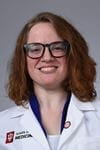 Undergraduate Institution: University of Maryland Eastern Shore
Undergraduate Institution: University of Maryland Eastern Shore
Graduate Department: Medical Neuroscience
Research Mentors: Randy Brutkiewicz, PhD and Donna Wilcock, PhD
Research: My interest is in understanding the relationship between Immunology and Neurology. In particular, investigating the role of the immune system in the development and or progression of neurodegenerative diseases like Alzheimer's.
 Undergraduate Institution: Purdue University
Undergraduate Institution: Purdue University
Graduate Department: Biomedical Engineering
Research Mentors: Joseph Wallace, PhD and Sharon Moe, MD
Research: My research investigates how chronic diseases-particularly Type 2 Diabetes and Chronic Kidney Disease-affect bone physiology and material properties using in vivo rodent models. Working at the intersection of biomedical engineering and nephrology, I am guided by Dr. Joseph Wallace and Dr. Sharon Moe to apply experimental and analytical techniques to these systemic diseases. As an aspiring physician-scientist, my goal is to translate research insights into clinical strategies that improve bone health outcomes in patients with renal and metabolic disorders.
 Undergraduate Institution: Indiana University Purdue University Indianapolis
Undergraduate Institution: Indiana University Purdue University Indianapolis
Graduate Department: Microbiology and Immunology
Research Mentors: Dibyadyuti Datta, PhD and Chandy John, MD
Research: My graduate research focuses on elucidating the pathogenesis of neuronal injury in cerebral malaria to better understand its role in long-term neurocognitive impairments among pediatric populations. Building on prior work investigating contributors to cognitive outcomes in Ugandan children with severe Plasmodium falciparum malaria, I now use a human iPSC-derived blood-brain barrier model to study how host and parasite factors contribute to endothelial dysfunction, neuroinflammation, and neuronal damage. I also aim to identify non-invasive prognostic biomarkers of brain injury to support clinical decision-making in low-resource settings. Broadly, I am committed to translational research in global health and infectious disease, with the goal of developing scalable interventions that improve outcomes for vulnerable pediatric populations.
GS2
 Undergraduate Institution: Purdue University
Undergraduate Institution: Purdue University Graduate Department: Medical Neuroscience
Research Mentor: Jignesh Tailor, MD, PhD
 Undergraduate Institution: The University of Alabama
Undergraduate Institution: The University of AlabamaGraduate Department: Biochemistry and Molecular Biology
Research Mentor: Carmella Evans-Molina, MD, PhD
Research: My research focuses on the pathophysiology of Type 2 Diabetes, particularly identifying changes in microRNA activity and calcium homeostasis that contribute to pancreatic beta cell dysfunction. In pursuing this research, I hope to further the understanding of beta cell physiology so it may be leveraged to prevent progression of Type 2 Diabetes.
 Undergraduate Institution: Brigham Young University
Undergraduate Institution: Brigham Young University
Graduate Department: Biomedical Engineering (Purdue University)
Research Mentors: Sherry Harbin, PhD and Stacey Halum, MD
Research: My research focuses on developing a regenerative implant to treat unilateral vocal fold paralysis. We aim to produce an implant that improves acute symptoms of vocal fold paralysis (Dysphonia, dysphagia, and aspiration) and restores vocal fold innervation and function. This regenerative implant combines a polymeric collagen biomaterial that persists and remodels into native tissue without immune-mediated bioresorption as well as autologous motor-endplate expressing cells that induce neuromuscular junction formation within the denervated muscle, increasing muscle innervation and bulk. We anticipate this regenerative implant to be the first curative treatment for persistent unilateral vocal fold paralysis, consistently restoring voice-related quality of life in these patients.
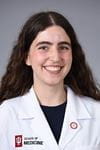 Undergraduate Institution: Indiana University
Undergraduate Institution: Indiana University
Graduate Department: Biomedical Engineering
Research Mentor: Elsje Pienaar, PhD
Research: I am broadly interested in mechanistic modeling of biological systems, including collective cell dynamics and cell-environment interactions. My current research is focused on agent-based modeling of T cell exhaustion in non-tuberculous mycobacteria infection. As an aspiring physician-scientist, I am interested in applying computational tools to study disease progression and treatment, working towards digital twins to predict individual patients' prognoses and optimize therapeutic approaches.
 Undergraduate Institution: Case Western Reserve University
Undergraduate Institution: Case Western Reserve University
Graduate Department: Pharmacology and Toxicology
Research Mentor: Elizabeth Yeh, PhD
Research: As an undergraduate, my research focused on the role of iron in the pathogenesis of and relationship between ocular and neurodegenerative disorders. Now, I am working with Dr. Liz Yeh to understand the role of HUNK (hormonally upregulated Neu-associated kinase) in triple-negative breast cancer. HUNK is a relatively newly discovered kinase that has been shown to promote breast cancer tumor growth and metastasis in mouse models. Using spatial transcriptomics and proteomics on sections of mouse tumors, I will further explore the role of HUNK in triple-negative breast cancer and its interaction with the immune system and tumor microenvironment.
 Undergraduate Institution: Purdue University
Undergraduate Institution: Purdue UniversityGraduate Department: Medical and Molecular Genetics
Research Mentor: Jungsu Kim, PhD
Research: With a background in Neurobiology and Biochemistry, I am extremely interested in studying neurodegenerative diseases from a biochemical standpoint. Previously my research focused on studying the implication of the dysregulation of human deubiquitinate enzymes in neurodegenerative diseases and cancer. As a future physician-scientist, I hope to contribute to our understanding of the molecular mechanisms underlying neurodegeneration and advance our therapeutic strategies for neurologic disease.
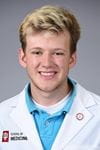 Undergraduate Institution: University of Kentucky
Undergraduate Institution: University of Kentucky
Graduate Department: Biochemistry and Molecular Biology
Research Mentor: Carmella Evans-Molina, MD, PhD
Research: I am interested in better understanding why the immune system attacks pancreatic beta cells in Type 1 Diabetes. My research focuses on how alterations in both lymphocytes and beta cells can contribute to the development of autoimmune diabetes, specifically focusing on calcium signaling. By pursuing this research, I hope to contribute to a better understanding of mechanisms of diabetes development that can be exploited to prevent and treat this disease.
 Undergraduate Institution: University of Illinois at Urbana-Champaign
Undergraduate Institution: University of Illinois at Urbana-Champaign
Graduate Department: Medical Neuroscience
Research Mentor: Jungsu Kim, PhD
Research: My previous research has focused on fetal neurodevelopment in the context of maternal immune activation and the gut microbiome, which have been epidemiologically linked to autistic and schizophrenia-like behavior in offspring. I have also performed research on the brain-gut axis, focusing on the impact of dietary fiber on pro-inflammatory microglia in an aged mouse model. Currently, I study the role of neuroinflammation in Alzheimer's disease, and I hope to better elucidate its mechanism of pathology as well as develop potential therapeutics that can be brought to the patients' bedside.
 Undergraduate Institution: Purdue University
Undergraduate Institution: Purdue UniversityGraduate Department: Biomedical Engineering
Research Mentor: Matthew Ward, PhD
Research: My current research under Dr. Matthew Ward is centered around novel biomodulatory therapeutics and diagnostics for understudied and undertreated conditions. More specifically my research focuses on wearable based diagnostics and transcutaneous auricular vagus nerve stimulation (taVNS) in areas of Ehlers-Danlos Syndrome, POTS, and tinnitus. I hope to develop or at least lay much groundwork for a new wearable device aimed at personalized treatment and detection of these patients' conditions.
 Undergraduate Institution: Cornell University
Undergraduate Institution: Cornell University
Graduate Department: Medical Neuroscience
Research Mentor: Brian Pierchala, PhD
Research: I'm interested in understanding the genetic pathways of motor neuron degeneration in amyotrophic lateral sclerosis (ALS). My research with Dr. Pierchala uses mouse models to study disease pathology and evaluate potential therapeutics. I'm excited to continue pursuing neuroscience from a genetic and molecular perspective with translational goals.
GS3
 Undergraduate Institution: Washington University in St. Louis
Undergraduate Institution: Washington University in St. Louis
Graduate Department: Medical Neuroscience
Research Mentor: Jungsu Kim, PhD
Research: My research focuses on using multi-modal model systems to study the human nervous system and neurological disease. I have experience modeling these conditions through mouse models, induced pluripotent stem cells, and computational approaches. Currently, I am working to integrate in vitro and in vivo models to investigate how genetic variations in the immune system influence Alzheimer's disease pathology.
 Undergraduate Institution: University of Notre Dame
Undergraduate Institution: University of Notre Dame
Graduate Department: Medical Neuroscience
Research Mentor: Karen Pollok, PhD
Research: My research interests lie at the intersection of oncology, pediatrics, neuroscience, and immunology. I have experience in translational and clinical breast cancer and immunology research and am excited about targeted cancer therapeutics, tumor modeling and biobanking, neuro-oncology, and immunotherapies. I work in Dr. Karen Pollok’s lab, studying pediatric glioma, focusing on cancer signaling pathways, targeted therapeutics, and patient-derived xenograft models.
 Undergraduate Institution: University of Missouri-Columbia
Undergraduate Institution: University of Missouri-Columbia
Graduate Department: Biochemistry
Research Mentor: Mark Kelley, PhD
Research: My research is focused on characterizing the multifunctional protein APE1/Ref-1 and its role in cancer, specifically in pancreatic cancer. APE1/Ref-1 gets its two names from its two key functions: DNA repair and redox regulation. In its redox regulatory role, it has been shown to be overexpressed in multiple types of cancer and other diseases of chronic inflammation. My lab has generated APE1/Ref-1 specific inhibitors, which have undergone phase 1 clinical trials for pancreatic cancer. The focus is now on generating second and third-generation compounds which maintain the safety profile observed in the first round of trials while increasing the potency/efficacy of the effect observed.
 Undergraduate Institution: Purdue University
Undergraduate Institution: Purdue University
Graduate Department: Biomedical Engineering
Research Mentors: Kelvin Lee, MD and Xiaoping Bao, PhD (Purdue University)
Research: As an aspiring physician-scientist, I seek to bridge the gap that currently exists between the laboratory and the clinic in the field of hematological malignancies. My long-term research goals largely revolve around 1. understanding immune cell differentiation, 2. developing novel adoptive cellular therapies, and 3. targeting immuno-evasive mechanisms of cancer (especially Multiple Myeloma). I am currently under the mentorship of Dr. Kelvin Lee (current Director of IU Simon Comprehensive Cancer Center) and Dr. Xiaoping Bao (Professor of Chemical Engineering at Purdue University).
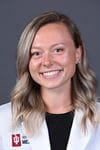 Undergraduate Institution: Indiana University
Undergraduate Institution: Indiana University
Graduate Program: Anatomy, Cell Biology & Physiology
Research Mentor: Sharon Moe, MD
Research: My primary research interest is lifestyle modification, including nutrition and exercise intervention, for the prevention and treatment of chronic disease. The focus of my current research with Drs. Sharon Moe and Matt Allen is on the effect of irisin, a myokine released during exercise, on bone and its crosstalk with other molecules in chronic kidney disease-mineral bone disorder (CKD-MBD). I utilize an in vivo animal model of CKD-MBD, an vitro osteocyte model, and human tissue samples. Secondary projects include exploring the effects of dietary choices and patterns on CKD outcomes.
 Undergraduate Institution: Indiana University
Undergraduate Institution: Indiana University
Graduate Department: Microbiology and Immunology
Research Mentor: Matthew Turner, MD, PhD
Research: My research is focused on the mechanisms of allergic skin inflammation, specifically atopic dermatitis. I am working to delineate the cellular sources, regulation, and mediators of cytokines involved in the disease process. Our goal is to discover new molecular pathways that promote disease and translate these discoveries into improved novel treatments for patients.
GS4
 Undergraduate Institution: Brigham Young University
Undergraduate Institution: Brigham Young University
Graduate Department: Biochemistry and Molecular Biology
Research Mentor: Amelia Linnemann, PhD
Research: My PhD research focuses on understanding how maladaptive stress response pathways contribute to β-cell dysfunction and death in diabetes development. The Linnemann Lab was first to discover that the stress response pathway of autophagy is impaired prior to the onset of Type 1 Diabetes (T1D), implicating this pathway in T1D pathogenesis. My thesis project has built on this previous work to show that impaired β-cell autophagy induces endoplasmic reticulum stress, alters pathways of antigen presentation, and enhances islet immunogenicity. My current work focuses on understanding the mechanisms through which dysfunctional autophagy alters β-cell dialogue and recognition to surveilling immune cells.
 Undergraduate Institution: The Ohio State University
Undergraduate Institution: The Ohio State University
Graduate Department: Microbiology & Immunology
Research Mentor: Martin Richer, PhD
Contact Information: almocart@iu.edu
Research: With previous research experience in molecular biology, global public health, epidemiology, and clinical infectious diseases, I strive to combine these disciplines to study and counteract global emerging viral pathogens. For my dissertation I am investigating mechanisms of Zika virus immune evasion with the goal to ultimately improve our clinical understanding of Zika infection and provide developing nations with the knowledge to counteract Zika outbreaks. In parallel, I am collaborating with Dr. Molly Duman Scheel at IU School of Medicine South Bend to explore community knowledge, attitudes, and practices related to mosquitoes and mosquito control and determine how these factors may shape public acceptance of emerging vector control strategies. As the world's deadliest animal, the mosquito plays a central role in viral transmission to humans, making public perception a key component in the success of future control efforts and the prevention of mosquito-transmitted outbreaks and epidemics.
 Undergraduate Institution: Stanford University
Undergraduate Institution: Stanford University
Graduate Department: Microbiology and Immunology
Research Mentor: Mark Kaplan, PhD
Research: My research focuses on Systemic Lupus Erythematosus (SLE) and the role of IL-9 in various murine models of this heterogenous disease. Some of the models I use are well-known such as the MRL/lpr model and others are novel models with alternatively spliced Foxp3 isoforms in an MRL model to recapitulate aspects of human SLE. I am working to apply this knowledge to develop a novel CART cell polarized to a T9 phenotype for use in SLE.
 Undergraduate Institution: North Park University
Undergraduate Institution: North Park UniversityGraduate Department: Medical and Molecular Genetics
Research Mentor: Karen Pollok, PhD
Research: My undergraduate research and publications focused on growing health awareness of dietary supplements derived from plants and marine sources. My current interests are in personalized medicine from studying human genes in different cancers. Pollok lab aims to build upon the standard-of-care therapy for sarcoma by modulation of dysregulated signaling networks and focuses on developing novel curative and maintenance therapies for pediatric sarcomas.
 Undergraduate Institution: Indiana University-Indianapolis
Undergraduate Institution: Indiana University-Indianapolis
Graduate Department: Medical Neuroscience
Research Mentor: Bruce Lamb, PhD
Research: My current research interests involve using mouse models and human data to better understand genetic contributions to Alzheimer's Disease (AD). Specifically, we are investigating novel variants of PLCG2, a phospholipase which, in the brain, is found exclusively in microglia and has important functions in immune receptor signaling and microglial activation in AD. This work could reveal novel targets for therapeutic intervention through up- or downregulation of PLCG2 in patients with AD.
 Undergraduate Institution: Earlham College
Undergraduate Institution: Earlham College
Graduate Department: Molecular & Medical Genetics
Research Mentor: Mateusz Opyrchal, MD, PhD
Research: My PhD work in Dr. Mateusz Opyrchal’s lab focuses on the identification of therapeutic targets for treating Triple Negative Breast Cancer. Specifically, we intend to exploit the immune defense mechanisms against cancer and to identify biological targets that may improve T-cell cytotoxicity towards solid tumors.
 Undergraduate Institution: Purdue University
Undergraduate Institution: Purdue University
Graduate Department: Medical and Molecular Genetics
Research Mentors: Wade Clapp, MD and Steven Rhodes, MD, PhD
Research: I have always been intrigued by molecular pathways’ role in the progression and metastasis of cancer. For my undergraduate thesis, I conducted pancreatic ductal adenocarcinoma research characterizing a signaling pathway receptor and molecular mutations contributing to malignancy. In my PhD research, I hope to continue identifying novel therapeutic targets in molecular pathways that can contribute to personalized treatment strategies and improved survival outcomes in cancer patients.
 Undergraduate Institution: Milwaukee School of Engineering
Undergraduate Institution: Milwaukee School of Engineering
Graduate Department: Biomedical Engineering
Research Mentors: Yunjie Tong, PhD (Purdue University) and Qiuting Wen, PhD (Indiana University)
Research: I am interested in researching functional imaging techniques to greater understand organ function in-vivo. I want to research the application of these imaging techniques so they can be used to detect organ dysfunction and disease progression. My goal is to combine my passion for both engineering and medicine to answer pertinent clinical questions.
GS5
 Undergraduate Institution: Indiana University
Undergraduate Institution: Indiana University
Graduate Department: Medical Neuroscience
Research Mentor: AJ Baucum, PhD
Research: My prior research consisted of both basic (localizing endocannabinoid proteins throughout the brain) and applied science (investigating effects cannabinoids on neurodevelopment). My current work examines the role of Protein Phosphatase 1 (PP1) targeting proteins in striatal physiology and behavioral output. Through behavioral, biochemical, and proteomic studies, I'm evaluating how the PP1 targeting protein, neurabin, impacts motor learning and motor learning associated striatal signaling.
MS3
 Undergraduate Institution: University of Colorado – Boulder
Undergraduate Institution: University of Colorado – Boulder
Graduate Department: Microbiology and Immunology
Research Mentor: Nathan W. Schmidt, PhD
Research: My graduate project looks to describe how the gut microbiome alters susceptibility to severe malaria in Ugandan children. I assess bacterial sequencing data, immune cell sequencing, and functional tests with mouse models to reveal the microbiome's impact on the immune system's ability to fight parasitic infections.
 Undergraduate Institution: Indiana University-Indianapolis
Undergraduate Institution: Indiana University-Indianapolis
Graduate Department: Microbiology and Immunology
Research Mentor: Rachel Katzenellenbogen, MD
Research: My research interests are focused on elucidating the cellular mechanisms involved in Human Papillomavirus (HPV) type 16 infections. HPV is responsible for a range of clinical manifestations and is the cause of nearly all cervical cancers; however, there are currently no therapeutics available that target the virus specifically. My research aims to understand how HPV 16 utilizes cellular machinery and alters gene expression to establish and maintain infection.
 Undergraduate Institution: Massachusetts Institute of Technology
Undergraduate Institution: Massachusetts Institute of TechnologyResearch Mentors: Rosie Kaplan, MD (NCI) and Francesca Buffa, PhD (Oxford)
Graduate Department: NCI: Department of Oncology, University of Oxford
Research: My work evaluates myeloid-tumor cell interactions and their effect on immune activation. Through functional and transcriptional studies, I mapped pathways regulating these cell-cell communication mechanisms and their resulting signaling cascades. As such, we identified targets that modulate myeloid activity as potential candidates for therapies seeking to reprogram the immune compartment in the tumor microenvironment.
 Undergraduate Institution: Indiana University Purdue University Indianapolis
Undergraduate Institution: Indiana University Purdue University Indianapolis
Research: As an undergraduate, I researched in Indianapolis and Ecuador on medical anthropological topics such as medical pluralism, demographic transition, and explanatory frameworks of chronic illness. I have also worked as a research coordinator on an NIEHS-funded interdisciplinary project through Purdue University on volatile organic compound exposure in a rural Indiana town. These experiences fostered a desire to perform rigorous scholarship in social science and medicine in a mutually informative way. However, I hope to focus and apply my research to topics such as gerontology and Alzheimer’s Disease and Related Dementias (ADRD).
 Undergraduate Institution: Purdue University
Undergraduate Institution: Purdue UniversityGraduate Department: Biomedical Engineering
Research Mentors: Carmella Evans-Molina, MD, PhD (Indiana University) and Fang Huang, PhD (Purdue University)
Research: My research interests lie in diabetes, specifically in gaining a better understanding of how the pancreatic beta cells fail to try to slow or halt the progression of diabetes as well as create new therapeutics targeted at beta cell health. I am currently researching how estrogen may play a role in beta cell identity and function and how it may therefore contribute to the pathophysiology of type 2 diabetes. Additionally, I am applying super-resolution microscopy to the beta cell in order to characterize the ultrastructural architecture of the organelles of the β-cell under healthy and diabetic conditions to correlate the relationship between structure and function and potentially identify new treatment options for this disease that targets organelle health.
 Undergraduate Institution: Washington University in St. Louis
Undergraduate Institution: Washington University in St. Louis
Graduate Department: Medical Neuroscience
Research Mentor: Leslie Hulvershorn, MD
Research: I am broadly interested in the neurobiological basis of psychiatric and addictive disorders. My dissertation research utilized neuroimaging to evaluate sex differences in addiction risk and substance use outcomes.
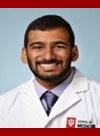 Undergraduate Institution: University of Pittsburgh
Undergraduate Institution: University of Pittsburgh
Graduate Department: Biomedical Engineering
Research Mentors: Michael G. Heinz, PhD and Hari Bharadwaj, PhD
Research: I utilized my background in engineering, signal processing, and music to study the processing of pitch by the auditory system-- particularly in sensorineural hearing loss (SNHL). By leveraging controlled animal models of SNHL, I interpreted patterns in behavior and electrophysiology relevant to the neural processing of pitch and periodicity in human listeners. Through this work, we identified specific perceptual consequences that could be linked to deficits in cochlear tonotopic organization (place) and temporal coding (time) deficits. More information on this work can be found at sivaprakasaman.github.io/research/.
 Undergraduate Institution: Indiana University - Indianapolis
Undergraduate Institution: Indiana University - IndianapolisGraduate Department: Medical and Molecular Genetics
Research Mentor: Jason Meyer, PhD
Research: My prior research experiences have mostly centered around neuroscience, including the role of inflammatory pathways in depression, addiction, and traumatic brain injury. My current research involves modeling Alzheimer's Disease using an in vitro human stem cell model. Specifically, I am working to determine the impact of a single nucleotide variant in the CX3CR1 gene on microglia function and possible neurodegenerative effects related to Alzheimer's Disease.
 Undergraduate Institution: Rutgers University-New Brunswick
Undergraduate Institution: Rutgers University-New Brunswick
Graduate Department: Biochemistry and Molecular Biology/Medical Neuroscience
Research Mentors: Amber Mosley, PhD and Jungsu Kim, PhD
Research: My undergraduate and post-undergraduate research focused on transcriptional and post-transcriptional regulation of different systems. My first lab experience focused on the effects of RNA-binding proteins on the development of the neocortex. Afterwards, I joined a bioinformatics lab focusing on the RNA translation of Dengue virus infected cells and, on a different project, colon cancer. I hope to integrate multi-omics (proteomics, transcriptomics, genomics) studying relevant genes and proteins to neurological diseases.
MS4
 Undergraduate Institution: University of Dayton
Undergraduate Institution: University of Dayton
Graduate Department: Medical Neuroscience
Research Mentor: David Kareken
Research: My current research interests center around functional reward circuitry imaging of the human brain and how it relates to common human vices.
 Undergraduate Institution: University of Michigan
Undergraduate Institution: University of Michigan
Graduate Department: Biomedical Engineering
Research Mentors: Jacqueline Linnes, PhD and Natalia Rodriguez, PhD (Purdue University)
Research: My previous research at the University of Michigan focused on cancer genetics, nanoparticle-based drug delivery and vaccines, and biomaterial characterization. My PhD research at Purdue combines public health and engineering approaches to develop a rapid cervical cancer screening test by detecting human papillomavirus (HPV). We began by conducting interviews and a large survey with Indiana clinicians to identify barriers to screening and define the essential features of a useful test. Guided by this input, we designed a testing method for outpatient clinics that detects HPV DNA to facilitate cervical cancer screening. Looking ahead, I aim to build a career in clinically-informed engineering research that expands access to public health and preventive care for underserved populations. I also plan to spend around 20-40% of my time practicing pediatrics to contribute to my clinical field and ensure my research remains grounded in real-world clinical needs.
 Undergraduate Institution: Bowdoin College
Undergraduate Institution: Bowdoin College
Graduate Department: Medical and Molecular Genetics
Research Mentor: Reuben Kapur, PhD
Research: I am interested in the factors driving cancer pathogenesis and the development of novel therapies. Previously, I investigated the mechanisms underlying the cancer predisposition syndrome neurofibromatosis type 2 (NF2) and developed potential therapies for NF2 patients with Dr. Long-Sheng Chang and Dr. D. Bradley Welling at Nationwide Children’s Hospital and The Ohio State University. Studying NF2 inspired an interest in the genetic alterations that influence cancer development and progression and the aspects that make each patient’s disease process unique. To further explore the factors that promote oncogenesis, I am conducting my graduate research in the lab of Dr. Reuben Kapur. Using genetically-engineered and transplant mouse models, I am investigating the contributions of inflammatory signaling pathways to leukemogenesis and exploring the possibility of targeting these pathways for therapeutic intervention.
 Undergraduate Institution: Indiana University-Bloomington
Undergraduate Institution: Indiana University-Bloomington
Graduate Department: Biochemistry and Molecular Biology
Research Mentor: Shannon Hawkins, MD, PhD
Research: I am interested in pathologies of the female reproductive system, specifically, reproductive cancers. In my work with Dr. Hawkins, I studied the effects of hsa-miR-10a overexpression on the cell cycle and cell proliferation in ovarian clear cell carcinoma with and without concurrent endometriosis. As an undergraduate, my research focused on the effects of stress on the brain with a particular interest in sex difference of neuronal and microglial morphologies in the orbitofrontal cortex of Sprague Dawley rats. In my future career, I will pursue to improvements in patient quality of life and exploring better modalities for ovarian cancer detection and targeted treatments.
 Undergraduate Institution: Purdue University
Undergraduate Institution: Purdue University
Graduate Department: Medical and Molecular Genetics
Research Mentor: Kun Huang, PhD
Research: I am interested in experimental design, data science, biostatistics, and oncology. I want to organize clinical trials that take advantage of big data and machine learning technologies. My background is in translational research, focusing on pathogen detection in food systems. My current research is on histopathological image analysis for melanoma metastasis prediction and the use of transfer learning to map patient-level clinical characteristics onto cell-level data in prostate cancer.
 Undergraduate Institution: Brigham Young University
Undergraduate Institution: Brigham Young UniversityGraduate Department: Biomedical Engineering
Research Mentor: Craig Goergen, PhD (Purdue University)
Research: My research interests and ambitions are to help the pediatric patient population by using cardiovascular imaging to better characterize the complex mechanisms of disease and pathology that underly heart conditions. Recently, I have been working with Dr. Larry Markham at Riley Children's Hospital to develop biomechanical and machine learning methods to detect and track cardiomyopathy progression in children with Duchenne muscular dystrophy using cardiac magnetic resonance imaging.
 Undergraduate Institution: Ithaca College
Undergraduate Institution: Ithaca College
Graduate Department: Medical Neuroscience
Research Mentor: Woody Hopf, PhD
Research: My work has established a rodent model for investigation of heart rate variability as a biomarker in alcohol use disorder. Heart Rate Variability, the beat-to-beat variation in time between heartbeats, is a reliable index of the dynamic balance of the autonomic nervous system branches (sympathetic and parasympathetic). In humans, increases in HRV when exposed to alcohol stimuli have been shown to predict craving, relapse, and compulsion to drink alcohol. My work has demonstrated differences in autonomic drive between the sexes in relation to alcohol consumption, with female rat drinking related to parasympathetic measures and male rat drinking related to sympathetic measures. By establishing this model, the lab is now poised to investigate brain mechanisms that direct these cardiac responses to alcohol and reveal critical sex differences that will impart new wisdom toward personalized treatment of alcohol use disorder. My overall career goals are to practice psychiatry and further our scientific understanding of psychiatric disorders and neuroscience.
 Undergraduate Institution: Grove City College
Undergraduate Institution: Grove City College
Graduate Department: Microbiology & Immunology
Research Mentor: Mark Kaplan, PhD
Research: Current research interests involve discerning the roles that tissue resident memory T cells, particularly ones that secrete the cytokine IL-9, play in allergic airway responses.
 Undergraduate Institution: University of Pittsburgh
Undergraduate Institution: University of Pittsburgh
Graduate Department: Biomedical Engineering
Research Mentor: Vitaliy L. Rayz, PhD (Purdue University)
Research: My research interests involve leveraging data from current imaging techniques to create and determine parameters that allow for risk stratification in a given patient population. I am attempting to use machine learning methods to augment 4D flow MRI data in cerebral aneurysms. The ultimate goal is to be able to accurately determine parameters that influence rupture of these aneurysms.
 Undergraduate Institution: Purdue University
Undergraduate Institution: Purdue University
Graduate Department: Biomedical Engineering
Research Mentor: Elsje Pienaar, PhD (Purdue University)
Research: My research interests lie broadly in multiscale computational systems modeling. My dissertation work focused on agent-based modeling of cell culture granuloma models. Simulations were used to explore the role of structure, dimension, collagen, and matrix metalloproteinases in immune response to tuberculosis. Additional projects explored systems dynamics at molecular and population scales.
 Undergraduate Institution: Indiana University-Bloomington
Undergraduate Institution: Indiana University-Bloomington
Graduate Department: Microbiology and Immunology
Research Mentor: David Nelson, PhD
Research: My current research focuses on understanding localized and systemic immune responses against urogenital Chlamydia trachomatis infection ('chlamydia') and on investigating potential etiologies of nongonococcal urethritis.
 Undergraduate Institution: Ball State University
Undergraduate Institution: Ball State University
Graduate Department: Medical Neuroscience
Research Mentor: Jungsu Kim, PhD
Research: After an unexpected discovery, my PhD research transitioned from exploring the impact of neuroimmune dysfunction in neurodegeneration to investigating its role in metabolic disease and obesity. This work demonstrated the importance of hypothalamic microglia in regulating systemic metabolism. Beyond the scientific findings, this experience taught me the flexibility and adaptability essential to successfully leading a project outside of my lab's traditional expertise.
 Undergraduate Institution: Purdue University-Indianapolis
Undergraduate Institution: Purdue University-Indianapolis
Graduate Department: Medical and Molecular Genetics
Research Mentor: Stephanie Ware, MD, PhD
Research: My research in Dr. Stephanie Ware's lab regards understanding the genetic causes of heterotaxy, a syndrome caused by disturbed specification of left-right asymmetry during embryonic development. This abnormal left-right patterning leads to severe congenital heart defects as well as abdominal and/or thoracic organ abnormalities. Currently, mutations in Zinc finger of the cerebellum 3 (ZIC3) are the only known cause of X-linked heterotaxy. In one family with X-linked heterotaxy without a coding mutation in ZIC3, we identified a novel ZIC3 intronic variant predicted to result in abnormal RNA splicing of ZIC3. Therefore, we hypothesize a subset of X-linked heterotaxy cases may be caused by noncoding mutations in ZIC3 altering its RNA splicing. In addition, we hypothesize that non-coding mutations in enhancer regions controlling the expression of ZIC3 during early development may also cause X-linked heterotaxy. We are working to characterize these potential enhancer regions using multiomic approaches.